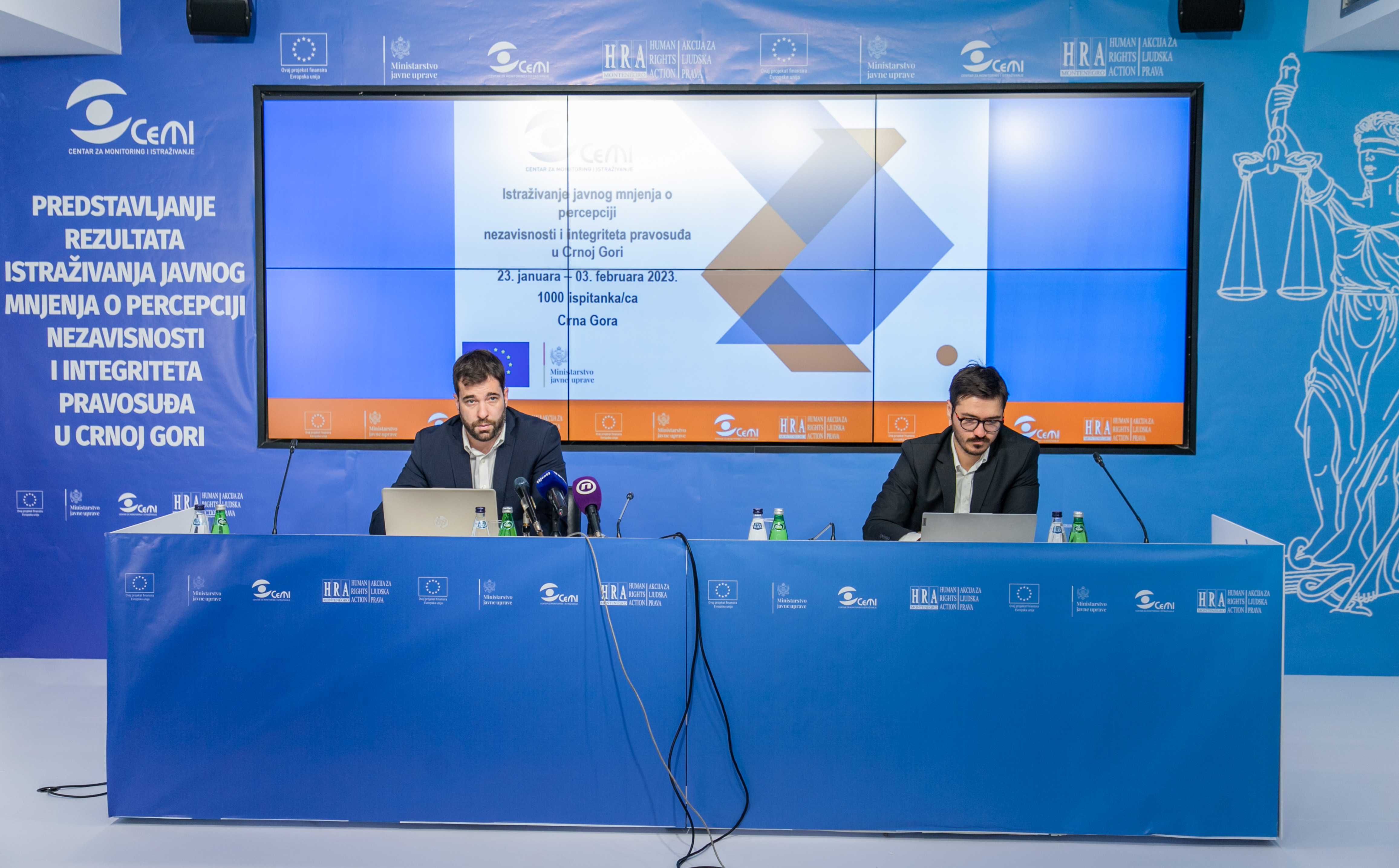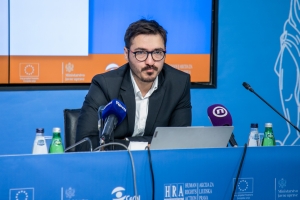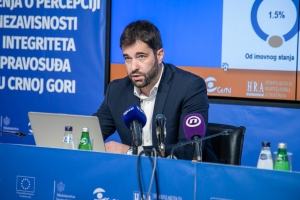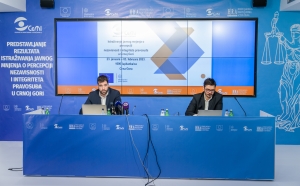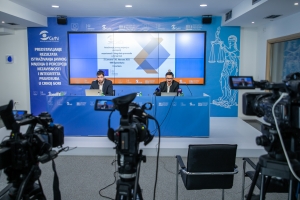In Montenegro, less than half of adult citizens have confidence in the judicial system, but that number is increasing compared to the previous period, according to research by the Centre for Monitoring and Research (CeMI).
The public opinion survey on the perception of the independence and integrity of the judiciary in Montenegro was conducted on January 23. until February 3 of this year on a representative sample of 1,000 adult citizens of Montenegro, as part of the project "Access to justice and human rights in Montenegro - trial monitoring project 2021-2023" which CeMI is implementing in partnership with Action for Human Rights (HRA), with the support of the European Commission and the Ministry of Public Administration.
The project coordinator of CeMI, Vladimir Simonovic, said that, compared to the results of the 2020 research conducted by that organization, the level of trust of citizens in the judicial system increased by ten percent, from 34 to 44 percent, and that the number of of citizens who do not have an opinion on this issue, from 17 to six percent.
"When it comes to citizens' contact with key institutions in the state, citizens stated that they are most often in contact with the police, 24 percent of them, lawyers 14.6 percent and courts 13.8 percent." In the last two years, citizens had the least direct contact with the prosecution 7.4 percent and with the Ombudsman 5.2 percent," said Simonovic at the press conference.
He indicated that 8.2 percent of respondents were involved in court proceedings as parties.
"Satisfaction with the work of the court is expressed by slightly more than two fifths of respondents, 41.2 percent, while slightly more than one fifth, 22.1 percent, are not satisfied with the work of the court in that procedure," said Simonovic.
According to him, more than half of the citizens, 57 percent of them, believe that they can expect a fair and just trial if they are a party to the proceedings, while more than one third, 35 percent of them, believe that they cannot, and eight percent are not sure.
"This is a significant increase compared to the results of the 2020 survey, according to which 29 percent of citizens believed that they could expect a fair and just trial, while 30 percent believed that they could not, and even 30 percent of citizens could not express themselves about this to the question, i.e. it was not safe", said Simonovic.
He pointed out that two-thirds of citizens, 66.3 percent of them, believe that court proceedings take an unnecessarily long time, because the courts are not efficient enough.
"This percentage was 51 percent in 2020, i.e. we observe a drastic increase in the negative perception of the public when it comes to the efficiency of the work of the courts. When we talk about the efficiency of the prosecution, the citizens have a similar attitude and almost two-thirds of the citizens, 64.9 percent of them, believe that the prosecution takes too much time to initiate proceedings," said Simonovic.
He pointed out that citizens point to corruption and the influence of politics as the biggest problem in the work of the judiciary and prosecutor's office.
"Namely, in the work of the courts, citizens emphasize the influence of politics in the first place, 39.9 percent of them, and in the second place, they cite corruption, 23.4 percent, in the third place, the duration of the procedure, 13.9 percent, while 9.9 percent of citizens believe that there is no problems in the work of the courts. When it comes to the work of the prosecutor's office, citizens cite corruption as the first problem, 38 percent of them, the second is the influence of politics, 27.8 percent, and the third is the duration of the procedure, 14.2 percent, while 9.9 percent of citizens do not know which is the biggest problem in the work of the prosecution," Simonovic said.
The Head of the Legal Department at CeMI, Ognjen Mitrovic, said that the project aims to contribute to further democratization and raising the level of application of the rule of law and respect for human rights in Montenegro, through an advocacy campaign aimed at key decision makers for legislative and institutional changes in the area of application. criminal justice system in Montenegro.
"One of the goals of the project is to strengthen public awareness of the most important aspects of equal access to justice, including new legal mechanisms and human rights." The goal of the project is to strengthen the role of civil society in promoting human rights and good governance, especially in the area of access to justice and the rule of law," said Mitrovic.
Presenting the findings of the research, he indicated that the public has a negative perception of the impact on the work of judges and prosecutors and the process of their advancement.
"Almost two-thirds of citizens, 62 percent of them, believe that judges are not selected and promoted based on expertise, while 32 percent have the opposite opinion. Citizens have a similar attitude on the issue of prosecutors' advancement, i.e. "61 percent of citizens believe that prosecutors in Montenegro are not selected and promoted based on expertise, while 32 percent think the opposite," Mitrovic said.
He explained that citizens who believe that the promotion of judges does not depend on expertise, believe that it depends mostly on political connections, 41.3 percent, on family and friendship ties, 35.8 percent, and on connections with leading people in the judiciary, 23, 8 percent.
"When it comes to prosecutors, almost half of the citizens, 49.2 percent, who believe that the advancement of prosecutors does not depend on their expertise, believe that their advancement depends on family and friendship ties."
"37.2 percent believe that the advancement of prosecutors depends on political connections, and 15.5 percent of citizens believe that it depends on connections with leading people in the judiciary," Mitrovic added.
As he added, more than half of the citizens, 56.9 percent of them, believe that the prosecution does not decide independently who to prosecute, while 34.5 percent of them think that the prosecution makes its decision independently, and 8.7 percent do not have an opinion on this question.
Speaking about the method of informing the public about the work of the courts and prosecutor's office, Mitrovic said that citizens are informed about the work of the courts mostly through television, 58.4 percent of them, and 21 percent through online newspapers and websites.
"Citizens are also informed about the work of the prosecutor's office in an approximate percentage (through television 56.7 percent and through online newspapers and websites 20.8 percent), Mitrovic stated.
According to him, considering that the largest number of citizens are informed about the work of the courts and prosecutor's office through the media, the CeMI asked citizens what they think about the work of the media when it comes to reporting on cases related to the work of judicial bodies in Montenegro.
"The largest number of respondents, 46.6 percent of them, expressed the opinion that they are and are not satisfied with the work of the media." Slightly more than one fifth of citizens, 27.6 percent of them, are generally satisfied, while 3.3 percent are completely satisfied with the work of the media. In contrast, 13.8 percent of citizens are generally not satisfied with the work of the media, and 5.3 percent are not at all satisfied with the work of the media when it comes to reporting on cases related to the work of judicial authorities," Mitrovic said.
When asked by a journalist whether the growth of citizens' trust in the judicial system can be linked to the fact that in the past year there have been arrests of leading members of the judiciary in the country, Mitrovic replied that he believes that the new persons in the state prosecutor's organization have influenced the growth trend confidence in the judiciary.
